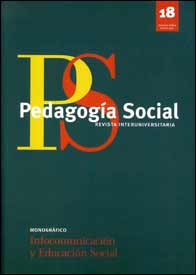Resolución de conflictos en las aulas: un análisis desde la Investigación-Acción.
DOI:
https://doi.org/10.7179/PSRI_2011.18.08Palabras clave:
Escuela, violencia, resolución de conflictos, investigación-acción, convivencia escolar, Schools, Violence, Problem Solving, Accion-Investigation, School convivialityResumen
El incremento de comportamientos agresivos y violentos en las escuelas es una realidad en estos últimos años caracterizados por profundas transformaciones sociales. La escuela como institución socializadora debe responder a las demandas de la sociedad. Se presenta en este artículo un estudio cuyos objetivos se centran en conocer los conflictos y conductas violentas que existen en las aulas, formar a los profesores ante esta situación a través de la investigación-acción, aplicar técnicas de grupos para detectar y resolver dichas conductas, elaborar propuestas de prevención de conductas conflictivas para favorecer un buen clima educativo y realizar propuestas concretas para promover la educación para la convivencia.
Para ello, se ha recogido información de un total de cuarenta y un centros educativos por todo el territorio español. La muestra objeto de estudio está constituida por alumnos y profesores de primaria y secundaria.
Se opta por una perspectiva multimétodo; se ha utilizado grupos de discusión, cuestionarios y técnicas de grupos en un proceso de investigación-acción, para reflexionar acerca de la práctica diaria docente y detectar y analizar las distintas conductas conflictivas del alumnado. Para finalizar con propuestas concretas para prevenir las conductas violentas y fomentar la convivencia.
---------------------------------------------------------------------
The increase of aggressive and violent behaviours in the schools is a reality in the latter years characterized by deep social transfor mations. The school like institution socializadora must answer to the demands of the society.
We presents in this article a study which aims centre on knowing the conflicts and violent conducts that exist in ace classrooms, on forming the teachers before this situation across the investigation-action, on applying technologies of groups to detect and to solve the above mentioned conducts, to elaborate offers of prevention of troubled conducts to favor a good educational climate and to realize concrete offers to promote the education for the conviviality.
There has gathered information of a total of forty one schools for the whole Spanish territory. The sample object of study is constituted by pupils and teachers of primary and secondary.
Multimethod is chosen; has used groups of discussion, questionnaires and technologies of groups in a process of investigationaction, for thinking brings over of the daily educational practice and to detect and to analyze the different troubled conducts of the student. Finish with offers to make concrete to anticipate the violent conducts and to promote the conviviality.
Descargas
Descargas
Publicado
Cómo citar
Número
Sección
Licencia
Derechos de autor 2014 Pedagogía social. Revista interuniversitaria

Esta obra está bajo una licencia Creative Commons Reconocimiento-NoComercial 3.0 Unported.
Derechos de reproducción y archivo
La versión publicada de los artículos podrá ser autoarchivada por sus autores en repositorios institucionales y temáticos de acceso abierto. No obstante la reutilización total o parcial de los mismos en nuevos trabajos o publicaciones deberá ser autorizada por Pedagogía Social. Revista Interuniversitaria.
Los trabajos publicados deberán ser citados incluyendo el título de la Revista, Pedagogía Social. Revista Interuniversitaria, nº, páginas y año de publicación.
Responsabilidades éticas
Pedagogía Social. Revista Interuniversitaria no acepta material publicado anteriormente en otros documentos. Los/as autores/as son responsables de obtener los permisos oportunos para reproducir parcialmente material de otras publicaciones y citar correctamente su procedencia. Estos permisos deben solicitarse tanto al autor/a como a la editorial que ha publicado dicho material.
Es obligación de Pedagogía Social. Revista Interuniversitaria detectar y denunciar prácticas fraudulentas.
En la lista de autores/as firmantes deben figurar únicamente aquellas personas que han contribuido intelectualmente al desarrollo del trabajo.
La revista espera que los/as autores/as declaren cualquier asociación comercial que pueda suponer un conflicto de intereses en conexión con el artículo remitido.
Los autores deben mencionar en el manuscrito, preferentemente en el apartado del método, que los procedimientos utilizados en los muestreos y controles han sido realizados tras la obtención de consentimiento informado.
La revista no utilizará ninguno de los trabajos recibidos con otro fin que no sea el de los objetivos descritos en estas normas.
Aviso de derechos de autor/a
© Pedagogía Social. Revista Interuniversitaria. Los originales publicados en las ediciones impresa y electrónica de esta Revista son propiedad del Pedagogía Social. Revista Interuniversitaria, siendo necesario citar la procedencia en cualquier reproducción parcial o total.
Salvo indicación contraria, todos los contenidos de la edición electrónica se distribuyen bajo una licencia de uso y distribución “Creative Commons Reconocimiento-No Comercial 3.0 España” (CC-by-nc). Puede consultar desde aquí la versión informativa y el texto legal de la licencia. Esta circunstancia ha de hacerse constar expresamente de esta forma cuando sea necesario.






